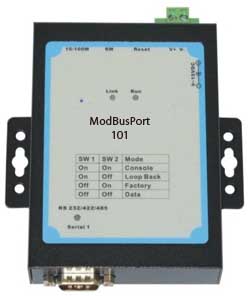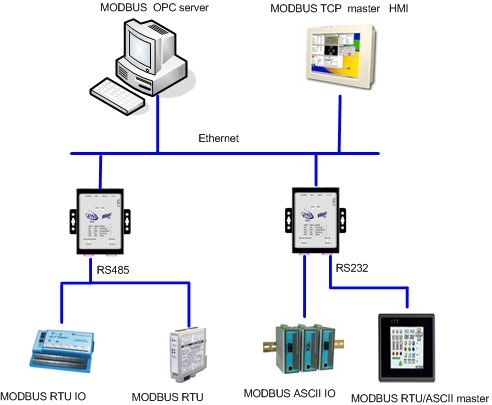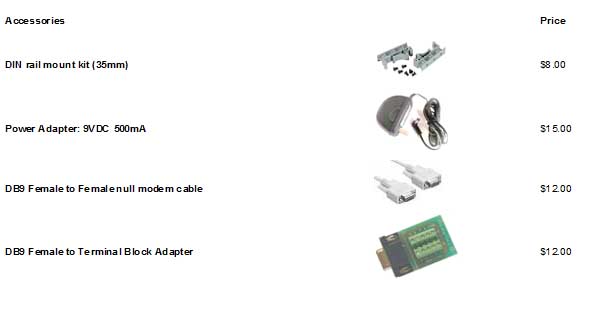|
Modbus Ethernet
Converter |
Convert
Modbus RTU/ASCII slaves
Modbus RTU IO
Modbus RTU
Modbus ASCII
to
Ethernet - ModBus OPC Srever and
Modbus TCP Master
-
Reliable communication between RS232/422/485
networks and IP networks
featuring Modbus protocol
-
Modbus protocol will be passed between TCP/IP
based networks and
Modbus serial line specification RTU/ASCII
-
Can be configured as TCP Client/Server or UDP
and operates in three modes:
Direct IP Mode, Virtual COM Mode, and Paired Mode
- DIN rail or panel mount
- supports 10/100 Mbps Ethernet
- supports LAN and WAN communications
- management access password protected
- Supports up to 8 Modbus TCP master
to Modbus RTU/ASCII. Queries from different masters are pipelined
and handled independently without disrupting each other.
- supports Modbus RTU/ASCII master to
link up to 8 Modbus TCP clients
- supports inactive timeout to
shutdown connection, which frees up the port for accepting the next
connection
- supports loop back mode, data is
echoed back for easy testing
- supports SNMP Get and Set function
|

|
Modbus RTU/ASCII: emerged in the mid-1970s for linking
terminals with Modicon PLC’s using a master/slave protocol. The
original Modbus serial line specification included two transmission
modes: RTU and ASCII. The Modbus RTU uses binary coding and CRC
error checking. Modbus ASCII mode is more readable, but less
efficient because each byte is represented by two ASCII code and it
uses less effective LRC error checking. The communications are
initiated by Modbus masters using polling, query/response protocol.
The master can send broadcast messages, using a unit ID of 0, which
all slaves accept, but do not reply to. Normally the master polls
individual slaves sequentially.
Modbus TCP: is designed to allow Modbus protocol to be
carries over TCP/IP based networks. Unlike Modbus RTU/ASCII, which a
master can communicate to multiple slaves using UID, Modbus TCP sets
up a point to point connection. To communicate with multiple slave
devices, different TCP/IP connection is needed for each slave
device. Also multiple polling/queries messages can be pipelined or
queued. The response messages could be replied out of order by the
slave devices. Therefore a transaction ID is assigned to each
polling message to avoid mixing up query and response message.
The MODport-10x, MODBUS gateway allows the legacy MODBUS RTU/ASCII
devices to operate on a MODBUS TCP network. It allows either MODBUS
serial master or slave to communicate with MODBUS TCP’s slave or
master.
Modbus TCP masters to Modbus RTU/ASCII slaves: MODPort 10X
allows multiple MODBUS TCP masters to communicate with a MODBUS
serial network. Since MODBUS serial network can only handle one
query at one time, queries from different masters are pipelined and
processed one by one.
Modbus RTU/ASCII master to Modbus TCP slaves: When
MODport-10X function as MODBUS RTU/ASCII master to MODBUS TCP slave
gateway, MODport-10X can connect up to 8 MODBUS TCP slave. User can
specify a UID range for each MODBUS TCP slace.
Inactive timeout: MODport-10X provides inactive timeout
that allows user to specify a time period to disconnect TCP/IP
connection if there is no activity in the network. It could be the
peer of the connection is down if the connection does not tear down
it would occupy one connection slot and prevent any another
connection again.
Configuration tools: User friendly MODport management
software provides an easy way to configure MODport-10X. It can
search all MODport within a local area network independent of its
subnet. It can also find a MODport of a specific IP address over
wide area network. MODport-10X can also be configured by its console
port or through telnet connection. MODport-10X also provides web
interface for user to configure it by a web browser.
MODport-10X will work at Loop back Mode, which all data is sent
back immediately for easy connection test.

| Serial Buffer: |
output: 64K bytes for MODport-101/102/111/112, 32K bytes for
MODport-104 |
| |
Input: 8K bytes per port |
| Serial Connection: |
DTE – BD-9 male |
| LAN: |
10/100 Mbps Auto-detecting – 10 Base T, 100 Base TX |
| Serial Interfaces: |
RS-232 - TX, RX, RTS, CTS, DTR, DSR, DCD, GND |
| |
RS-422 – TX+, TX-, RX+, RX-, RTS+, RTS-, CTS+, CTS-, GND |
| |
RS-485 - Data +, Data –, GND |
| Data Rate: |
110 bps to 230.4 k bps |
| Parity: |
none, even, odd, mark, space |
| Data Bits: |
5, 6, 7 or 8 |
| Stop Bits: |
1, 1.5 or 2 |
| Protocol: |
TCP, IP, ARP, DHCP, Telnet, HTTP, UDP, ICMP |
| Management: |
Manager software, Serial Console, Telnet, Web server Firmware
upgradeable |
| Dimensions: |
MODport 101/102/111/112: 3.35 x 4.5 x 0.90in (8.5 x 11.5 x 2.3cm) |
| |
MODport 104: 4.5 x 7.3 x 1.1in (11.4 x 18.5 x 2.9cm) |
| Power Requirements: |
9 ~15 VDC 500 mA MODport 101/102/111/112/104 |
| Operating Temperature: |
0 to 50 °C (32 to 122 °F) |
| Storage Temperature: |
-20 to 60 °C (-4 to 140 °F) |
| Humidity: |
0 – 90% Non-Condensing |
| Approvals: |
CE, FCC |
 |
also view
Modbus Ethernet Gateway
ARC ELECTRONICS
301-924-7400 EXT 25
jump to ... Home Page
arc@arcelect.com
|


